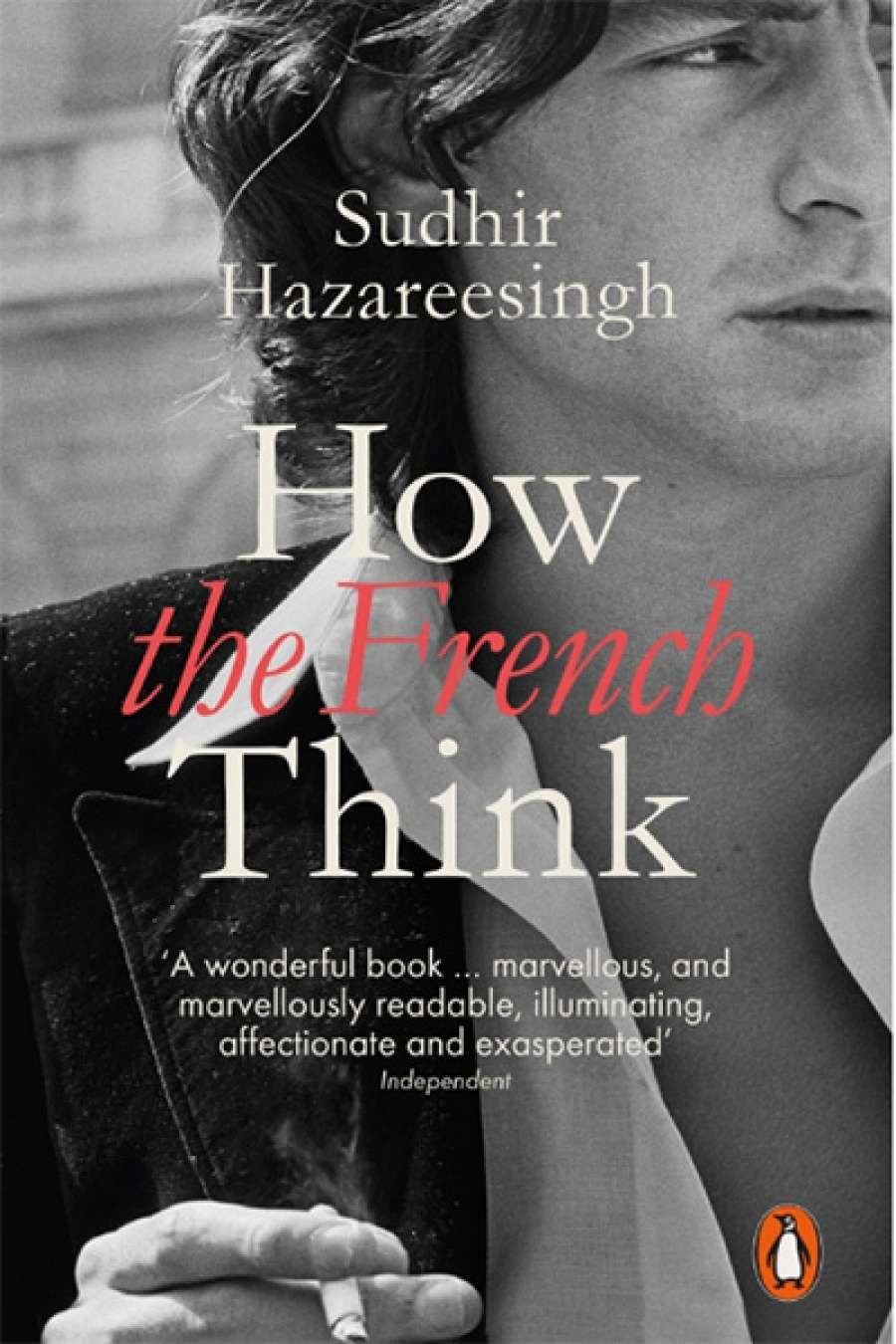
- Free Article: No
- Contents Category: French Studies
- Custom Article Title: Colin Nettelbeck reviews 'How the French Think: An Affectionate Portrait of an Intellectual People' by Sudhir Hazareesingh
- Book 1 Title: How the French Think: An Affectionate Portrait of an Intellectual People
- Book 1 Biblio: Allen Lane, $49.99 hb, 442 pp, 9781846146022
The role of René Descartes is presented as seminal and enduring for France's intellectual tradition. In the Discourse on the Method (1637), the idea of thought as ontology, the promotion of rationality over faith, the dualistic conception of reasoning, the elegance and clarity of the prose, together with a universalist spirit, make a formidable combination of elements that Hazareesingh posits as quintessentially French. In addition, the public celebrity and engagement of the man himself mark him as an ideal forerunner of the modern intellectual.
The other great progenitor is Jean-Jacques Rousseau, shown as bringing to the mix both a broad strand of Utopian yearning and a fierce demand for individual freedom. Like Descartes, Rousseau has remained, across the centuries, a national mythical figure; they have not only transcended France's frequent and momentous political regime changes, but have become quasi-indispensable reference points for completely opposed political viewpoints. The apparent primacy of the philosophical over the political in the constant interplay between the two is another example of French specificity, Hazareesingh argues, although today the primacy is no longer operative.
Hazareesingh is right to emphasise the metaphysical nature of the tradition of French secular thought, in both its content and its trappings. I am less convinced by his suggestion that the conflict between secularism and formal religion (and particularly the role of France as the 'eldest daughter' of the Catholic Church) was resolved so clearly or so promptly: he seems to forget that, well into the 1980s, more than eighty per cent of French people continued to identify themselves as Catholic. But he does admire the fervour and conviction with which the Enlightenment philosophers, and the likes of Saint-Simon, Fourier, Comte, and Renan in the nineteenth century, Beauvoir, Sartre, Camus, Lévi-Strauss, and Foucault in the twentieth, have sought to create systems of thought designed to benefit the whole of humanity.
One unusual and quite original feature of the book is the treatment given to the occult aspect of this background religiosity. It comes as a surprise to learn that men as prominent as Napoleon, Victor Hugo, and François Mitterrand were not averse to consulting mediums or participating in spiritualist séances.
The close interweaving of philosophical activity with France's turbulent social and political developments is at the core of Hazareesingh's reflection, and there is a great deal of insightful analysis of key events and figures, from the ancien régime and the 1789 Revolution all the way down to Nicolas Sarkozy and François Hollande. Particular points of concentration include Napoleon and Napoleon III, the stop-start evolution of republicanism, the tensions between Paris and regional France, the 1871 Paris Commune and the development of radical left politics, anti-Semitism and anti-Americanism, the French military collapse in 1940, de Gaulle and the Fifth Republic constitution, May 1968 and the creation of the European Union.
 Sudhir HazareesinghIt would seem that for Hazareesingh France's last great philosopher–intellectual was Jean-Paul Sartre – an undisputed giant in terms of his impact, albeit imperfect because so many of his chosen causes turned out to be historical dead-ends. Hazareesingh has respect for Michel Foucault, less for Jacques Derrida, and none at all for the way these two were taken up as 'theory' in the American academic world, an enterprise he describes as hollow and opaque. He notes the contributions of Pierre Bourdieu, and has kept up his reading of many younger 'progressive' thinkers, without detecting any serious new spark of life – although he reserves his judgement on Thomas Piketty, the economist who has become something of a global superstar. Hazareesingh's last two chapters before his conclusion are bleakly titled 'The End of History' and 'The Closing of the French Mind.'
Sudhir HazareesinghIt would seem that for Hazareesingh France's last great philosopher–intellectual was Jean-Paul Sartre – an undisputed giant in terms of his impact, albeit imperfect because so many of his chosen causes turned out to be historical dead-ends. Hazareesingh has respect for Michel Foucault, less for Jacques Derrida, and none at all for the way these two were taken up as 'theory' in the American academic world, an enterprise he describes as hollow and opaque. He notes the contributions of Pierre Bourdieu, and has kept up his reading of many younger 'progressive' thinkers, without detecting any serious new spark of life – although he reserves his judgement on Thomas Piketty, the economist who has become something of a global superstar. Hazareesingh's last two chapters before his conclusion are bleakly titled 'The End of History' and 'The Closing of the French Mind.'
Hazareesingh pays homage to the inspiration he received from the work of Theodore Zeldin and Tony Judt – the former for the pre-1945 period, the latter for his insights into post-World War II France. They are great models, and in many ways Hazareesingh has done them proud. His work is perhaps less cohesive than theirs; it often seems to proceed by playful association as much as by logical argument – darting about the chronology, underscoring anomalies and paradoxes, delighting in colourful anecdotes. For all that, it is rich, amazingly well informed and documented, dense but never turgid, and always very readable. And it moves inexorably forward to a conclusion that is more portentous than the lightness of the tone adopted. It is a great and entertaining challenge for all those – and there will be many – who would like to prove him wrong.


Comments powered by CComment